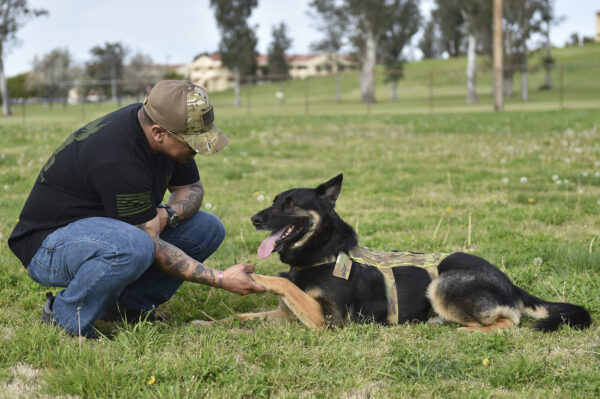
Retired Tech. Sgt. Brandon Jones credits his service dog, Apache, for saving his life by alerting him to PTSD triggers and helping him cope with his anxieties. (Photo: U.S. Air Force Tech. Sgt. Lilliana Moreno/Released)
A recent nationwide study, the largest of its kind and funded by the National Institutes of Health, sought to fill a research gap by comparing the effects of and without service dog partnerships for active Service Members and Veterans with PTSD.
The objective was to evaluate the impact of service dog partnerships on PTSD symptom severity, depression, anxiety, and psychosocial functioning among Service Members and Veterans after three months compared to the usual care patients receive.
Current treatments for PTSD are often insufficient, as many Service Members and Veterans struggle with uptake and retention of these therapies. Increasingly, Service Members and Veterans are turning to psychiatric service dogs as a complementary intervention, though their effectiveness remains under-researched. Service dogs are specially trained to assist individuals with disabilities, including PTSD. Preliminary studies suggest that service dog partnerships can lead to significant improvements in self-reported PTSD symptoms.
The study included Service Members and Veterans who applied for and were approved to receive a service dog from K9s For Warriors, a nonprofit organization that trains service dogs specifically for helping Service Members and Veterans. Participants in the study exclusively included those who served on or after September 11, 2001, had an honorable discharge, a current PTSD diagnosis, no convictions against animals, and were 18 years or older.
The intervention group received service dogs after a thorough training process, while the control group consisted of participants on the waiting list.
Primary outcomes measured were PTSD symptom severity, depression, and anxiety. Secondary outcomes included quality of life and social health. PTSD symptoms were assessed using both self-reported measures and clinician-administered scales. Depression and anxiety were measured using the PROMIS Depression and Anxiety scales. The study also monitored suicidality using the Columbia-Suicide Severity Rating Scale and the Patient Health Questionnaire.
Results showed that participants in the intervention group reported significantly lower PTSD symptom severity, depression, and anxiety after three months compared to the control group. These findings were consistent across both self-reported and clinician-rated assessments. Service Members and Veterans with service dogs also reported higher quality of life and better psychosocial functioning, although there were mixed results regarding social health.
Service dogs appeared to offer substantial benefits, with lower dropout rates compared to traditional PTSD treatments. The positive outcomes suggest that service dog partnerships can be an effective complementary intervention for PTSD in Service Members and Veterans. This intervention might work best when combined with other evidence-based treatments.
The study had some limitations, including nonrandom allocation of treatment and potential self-reporting biases. Additionally, results might not be generalizable to all Service Members and Veterans with PTSD, as the study focused on those seeking service dogs from a single organization.
PTSD in Veterans and Active Military
PTSD affects approximately 23% of Service Members and Veterans who served post-9/11. PTSD is marked by symptoms such as intrusion, avoidance of trauma reminders, negative changes in cognition and mood, and heightened arousal and reactivity. These symptoms cause significant distress or impairment in social, occupational, or other areas of functioning. Service Members and Veterans with PTSD are at a higher risk for conditions like major depression and generalized anxiety disorder and are 1.5 times more likely to die by suicide compared to non-veterans.
The NIH-funded study found that Service Members and Veterans who partnered with a trained psychiatric service dog saw a reduction in PTSD symptoms as well as an improvement in their psychosocial functioning, suggesting that service dogs may be a valuable complementary treatment for military-related PTSD.